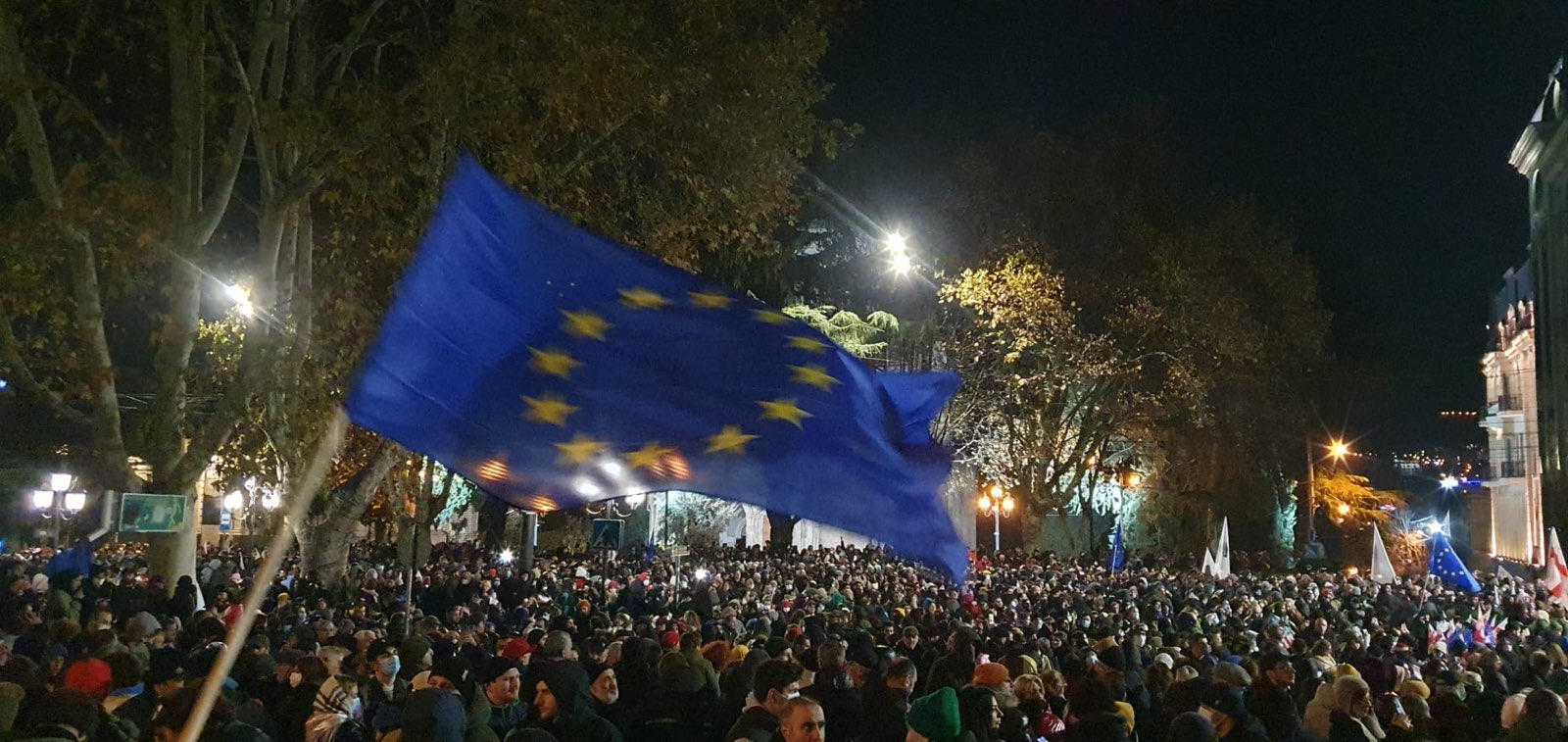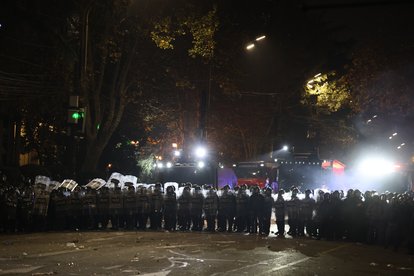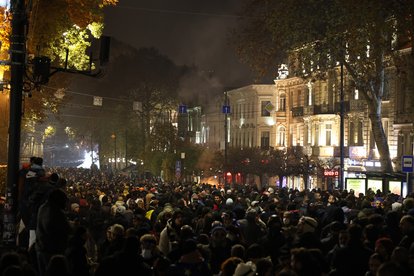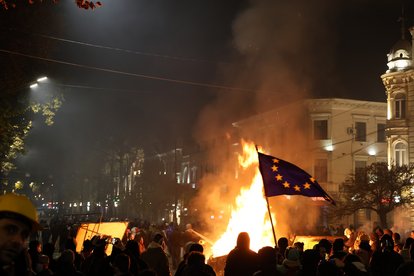Georgia's European Future
Georgia's Pro-European Protests

On November 28, 2024, the European Parliament adopted a resolution declaring the parliamentary elections of October 26 fraudulent, refusing to recognize their results and calling for sanctions against the leaders of the "Georgian Dream" party. In response, on the same day, acting Prime Minister Irakli Kobakhidze announced at a public briefing that the issue of opening negotiations with the European Union would not be on the agenda until the end of 2028. Additionally, Kobakhidze rejected any form of budgetary grants from the European Union until 2028.
The acting Prime Minister's statement is particularly outrageous, as overwhelming part of the Georgian population supports the country's integration into the European Union. According to the European Commission's Enlargement Report of October 30, 2024, the EU assessed the country's European integration process negatively. Specifically, the report states: “While in December 2023 the European Council granted candidate status to Georgia, its EU accession process has been meanwhile de facto halted due to the course of action taken by the Georgian government since Spring 2024”[1]. Despite this, Georgia received a package of recommendations and reforms from the European Commission, the implementation of which will facilitate the country’s eventual integration into the European Union. Despite the door for Georgia’s EU accession still beeing open the acting Prime Minister of Georgia, instead of adopting a strategy to implement the reforms outlined by the European Commission, announced the aforementioned decision.
The article provides a brief overview of the widespread human rights violations during the protests held from November 28 to December 9, 2024, and their inconsistency with international legal standards.
The Legality of Dispersing Protests
According to the Constitution of Georgia and the Law on Assemblies and Manifestations, freedom of assembly is guaranteed. Under Georgian law, the legal grounds for terminating an assembly include mass violations by participants, such as explicit and immediate incitement to violence, possession of prohibited items, and similar actions.
Contrary to these provisions, during the protests held from November 28 to December 9, 2024, the Ministry of Internal Affairs demanded the termination of protests under conditions where the demonstrations were peaceful despite certain tensions observed at specific locations. According to both Georgian legislation and the European Court of Human Rights case law[2], in instances where isolated illegal actions occur within a large-scale protest, proportional measures must be directed against those individuals rather than serving as a pretext for dispersing the entire protest.
The Ministry of Internal Affairs violated this principle in every instance of protest dispersal during this period, rendering their actions unlawful. This assessment is supported by the Public Defender of Georgia[3] and local non-governmental organizations[4], which have also highlighted the illegality of the Ministry’s decisions to disperse the protests.

The Use of Special Measures by the Ministry of Internal Affairs
Following the Ministry of Internal Affairs' unlawful decisions to disperse protests, law enforcement officials employed various special measures against protestors, including water cannons, pepper spray, tear gas canisters, and rubber bullets.
Under Georgian law and the European Court of Human Rights (ECHR) case law, the simultaneous, indiscriminate or disproportionate use of water cannons, rubber bullets, and tear gas against protest participants is prohibited[5]. When using force, police officers are required to minimize harm and ensure that measures are proportionate. The type and intensity of force used must be chosen based on the offense's nature and the offender's individual characteristics.
During the protests held between November 28 and December 9, 2024, the Ministry of Internal Affairs frequently used active special measures against peaceful demonstrators. Footage aired by the media and statements from local non-governmental organizations revealed the following:
- Water cannons were reportedly mixed with tear gas as reported by demonstrators and media;
- Pepper spray was deployed at close range and without justification, directly targeting individuals;
- Tear gas canisters were aimed at protesters, resulting in numerous injuries, including a serious incident where a 21-year-old man was struck in the eye by a canister and remains in critical condition.
These actions violate both national legal standards and international principles governing the proportional use of force during assemblies.
Inhuman Treatment and Unlawful Detention of Protesters and Journalists
Between November 28 and December 9, 2024, the Ministry of Internal Affairs detained more than 400 protesters under administrative procedures. Most of them were charged under Articles 166 (petty hooliganism) and 173 (disobedience to a lawful order of a police officer) of Georgia's Administrative Offenses Code. Additionally, as of December 9, 18 individuals were arrested under criminal law, with charges including: Damage or destruction of property[6]; Assault on a police officer or other public officials[7]; Organizing, leading, or participating in group violence[8]; Public incitement to violence[9] and Preparation for an explosion [10](one individual charged)[11].
Footage aired by media outlets and accounts from the Legal Aid Network's lawyers reveal alarming instances of brutality against detainees:
- The majority of detained individuals were reportedly beaten.
- Many were hospitalized with injuries such as bruises, fractures (nose and jaw), and concussions.
- All hospitalized individuals reportedly suffered from multiple hematomas, difficulty moving and speaking[12].
The absolute majority of the arrests were deemed unlawful:
- Detainees were held for the maximum 48 hours allowed under administrative detention.
- Lawyers were often denied timely access to their clients and were not informed of their location.
- Personal belongings and equipment were reportedly stolen from some detainees.[13]

Court proceedings displayed a disregard for fair trial principles:
- Judges routinely denied defense motions to review case materials, gather evidence, or summon witnesses.
- Cases were handled with bias in favor of the Ministry of Internal Affairs.
- Detainees were convicted solely based on police testimony, without corroborating evidence.
- Administrative detention was frequently imposed, even on visibly injured individuals[14].
Many police officers provided false testimony, often with no direct involvement in the arrests. Official documentation frequently listed officers as arresting parties despite their lack of connection to the incident.
Since November 28, during the coverage of pro-European protests, media professionals faced over 90 instances of interference in their work[15], accompanied by physical and verbal abuse against journalists and camera operators.[16].
Crimes involving inhuman treatment of protesters and obstruction of journalistic activities by employees of the Ministry of Internal Affairs fall under the jurisdiction of the Special Investigation Service. The Special Investigative Service launched inquiries into 319 reported cases of rights violations involving both protesters and media representatives[17]. However, local NGOs have criticized[18] these investigations as ineffective and superficial, reflecting broader concerns about accountability for inhuman treatment by law enforcement.
Such acts of violence, coupled with judicial bias, are utterly unacceptable, as they aim to suppress freedom of expression and silence pro-European voices advocating for Georgia's integration into the European Union. These actions undermine democratic principles and demand urgent accountability to safeguard human rights and the rule of law.

Conclusion
In December 2023, Georgia was granted EU candidate status and outlined criteria by the European Commission, the fulfillment of which would expedite the country’s EU accession process. However, subsequent actions by the government, involving mass human rights violations and undermining democratic institutions, led to the de facto suspension of the EU integration process, as noted in the European Commission's report dated October 30, 2024.
Now, it has become evident that instead of working towards EU integration, the government has decided to remove the issue from the agenda altogether until 2028. Peaceful protests against this decision were brutally suppressed by the authorities, with actions described by non-governmental organizations as crimes equivalent to torture and inhuman treatment[19]. The unlawful and disproportionate use of force during the dispersal of protests, as well as illegal court rulings against activists, raise legitimate concerns that the government aims to suppress freedom of speech, media, and assembly in Georgia entirely. This, in turn, threatens to alter the country’s foreign policy course towards Euro-Atlantic integration as enshrined in Article 78 of the Georgian Constitution.
Nevertheless, the Georgian people, from various professions and interest groups, have been peacefully protesting the actions of the government for over 12 days across the country. The wave of protests continues to grow day by day and takes on different forms, such as strikes, protest marches, performance actions, and others.
Author: Vasil Zhizhiashvili
The views, opinions, and conclusions expressed in this article are those of the author alone and do not necessarily reflect the official views or positions of the Friedrich Naumann Foundation for Freedom South Caucasus, the paper represents the author's independent analysis and insights, which may not coincide with the Foundation’s perspectives on every issue discussed.
[1] https://ec.europa.eu/commission/presscorner/detail/en/ip_24_5583
[2] Frumkin v. Russia, no. 74568/12, § 99, ECHR 2016
[3]https://www.facebook.com/OmbudsmanofGeorgia/posts/pfbid0LMc7fmBLXtKPq29Ux1dQbkZq3DFTseMwRFQZBsVNLVu9CBB6ANN49MRHs7V8tqa6l
[4]https://www.facebook.com/GYLA.ge/posts/pfbid0zBRE1iewnJgYAuhm8dLxRAmxtFAFAWw1keQkMitnTuUYz7FR5EH2zdz8bRDk6DLPl
[5] Süleyman Çelebi and Others v. Turkey (no. 2), 2017, § 111,
[6] Criminal code of Georgia article 187.
[7] Criminal code of Georgia Article 353¹:
[8] Criminal code of Georgia Article 225
[9] Criminal code of Georgia Article 239¹:
[10] Criminal code of Georgia article 229.
[11]https://gyla.ge/post/terororis10dge?fbclid=IwY2xjawHD-bFleHRuA2FlbQIxMAABHSBn8FLhYPl7ip8WHLggvSLr8G_5wk-NsNxpE71w0KSFtk5-9DD3XLeYdw_aem_9y93bVzavoJEs47kXIQWHQ
[12] https://gyla.ge/post/dakavebulebi-sastikad-nacemia
[13] https://gyla.ge/post/terororis10dge?fbclid=IwY2xjawHD-bFleHRuA2FlbQIxMAABHSBn8FLhYPl7ip8WHLggvSLr8G_5wk-NsNxpE71w0KSFtk5-9DD3XLeYdw_aem_9y93bVzavoJEs47kXIQWHQ
[14] Ibid.
[15] Article 154 of the Criminal Code of Georgia prohibits the unlawful interference with a journalist's professional activities.
[16] https://www.mediachecker.ge/ka/mediagaremo/article/99207-28-noembridan-mediis-saqmianobashi-khelsheshlis-80-ze-meti-incidenti-mokhda
[17]https://www.facebook.com/sis.gov.ge/posts/pfbid02QNzBpQWTByXMfPbYYd8coww956PMp7WxrSZwMhxokeNEPwXXM3Wdb2Cw4v1VHrYHl
[18] https://civil.ge/archives/627792
[19] https://gyla.ge/post/terororis10dge?fbclid=IwY2xjawHD-bFleHRuA2FlbQIxMAABHSBn8FLhYPl7ip8WHLggvSLr8G_5wk-NsNxpE71w0KSFtk5-9DD3XLeYdw_aem_9y93bVzavoJEs47kXIQWHQ
